
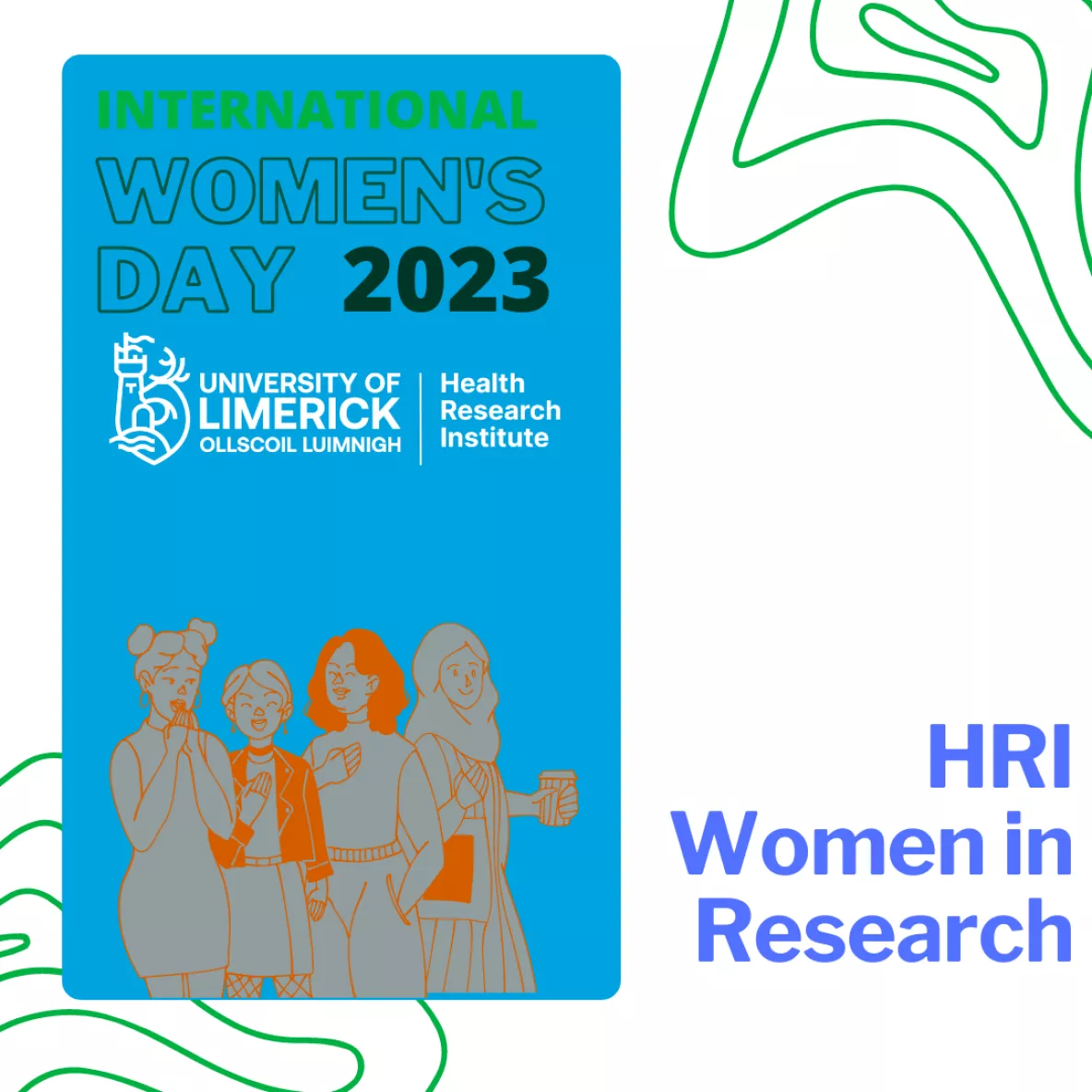
The HRI is marking International Women’s Day this year on March 8th by featuring profiles of our some of our female members in a series entitled ‘HRI Women in Research’.
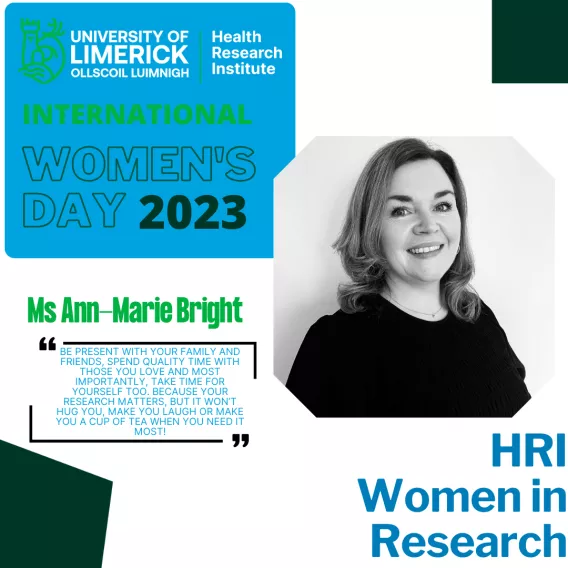
I’m Ann-Marie, I’m a Registered Psychiatric Nurse and lecturer based in the Department of Nursing and Midwifery.
My research interests centre around women’s mental health. My MSc is in Perinatal Mental Health and I have a special interest in this particular area of healthcare both as a practitioner and researcher. I am fortunate to have been able to contribute to knowledge in the areas of perinatal suicidal ideation, perinatal pregnancy loss and grief and perinatal mood and emotional disorders.
I am currently undertaking my PhD and my project focusses on women prisoners mental health. My aims are to understand better the experiences of women in prison in the context of prison-based mental health services. My methods are informed by Feminist Standpoint Theory that recognises the unique and socially positioned knowledge that women produce. This is an important project; the rate of female prison committals is increasing and a large percentage of women going to prison experience mental health problems. It’s important that we have a better understanding of the experiences of women in prison, so we can use this information to help ensure the services provided meets their needs.
I consider myself very fortunate to be based at the University of Limerick. As an early career academic, I am surrounded by excellent women who are leading, succeeding and inspiring others in interesting and diverse areas of research. In particular I think of the work of my colleagues in the Department of Nursing and Midwifery, which is a constant source of inspiration for me.
Taking a moment to reflect on my career to date I think of all the challenges I have faced and how they have helped me to grow as an academic and as a person. If I were to give advice to other women in research, particularly those who like me, are early career it would be:
-
Remember: not all advice is good advice
(And I include my own here too! Be discerning when taking advice on board)
-
Sleep is a superpower
(Adequate, good quality sleep is essential for all things)
-
Research matters, but it doesn’t really matter
(Be present with your family and friends, spend quality time with those you love and most importantly, take time for yourself too. Because your research matters, but it won’t hug you, make you laugh or make you a cup of tea when you need it most!)
I am delighted to have been asked to contribute to this feature for International Women’s Day and would like to give a shout out to the women in prison who shared and entrusted me with their stories - this quote is for them:
“Feminism isn’t about making women stronger. Women are already strong. It’s about changing the way the world perceives that strength” (G.D Anderson, 2013).
Twitter: @AnnMarieBright
LinkedIn: Ann-Marie Bright
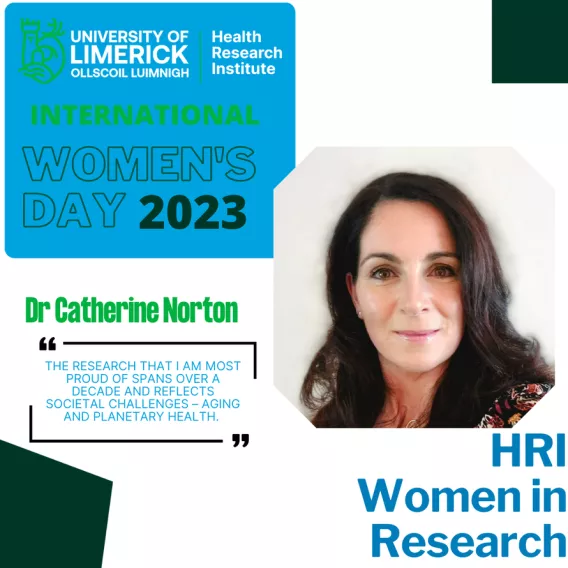
Dr Catherine Norton
Lecturer Sport & Exercise Nutrition, Department of Physical Education & Sport Sciences, Faculty of Education & Health Sciences
HRI Membership Type: Full
Socials @NortonNutrition @PessLimerick
Background
I am a Registered Dietitian, High Performance Sport & Exercise Nutrition registrant, Researcher and Lecturer in Sport & Exercise Nutrition. While I was studying human nutrition & dietetics in Dublin in the ‘90s I had a light-bulb moment when I realised I could marry my love of sport with my love of food, in what was an emerging discipline – sports nutrition. I am all about food and how it impacts human health and performance.
I have been working for over 20 years in food and health, across industry, healthcare, professional sport and most recently academia. I am past chair of the Irish Nutrition & Dietetic Institute Sport & Exercise Nutrition Interest Group and currently sit on the directorate of the European Sports Nutrition Society. I also hold associate membership in the British Dietetic Association Sport & Exercise Nutrition Group.
Most recently in my career (before I joined academia full time), I spent time providing performance nutrition supports to elite athletes as lead performance nutritionist at Munster Rugby. This fulfilled a lifelong ambition to work in professional sport, and I loved my time with this organisation. I returned to education to complete my PhD in 2014 (nutrition solutions to age related muscle mass loss; lessons from sport) and subsequently joined UL in 2016 (LBB PESS).
My Research
My research broadly aims to optimise peoples’ food knowledge, attitudes, and behaviours to support better health and performance. I work across different populations including patients, aging, students, the corporate sector and elite athletes. My varied research interests merge when I consider how environmental factors (built spaces) influence food choices and behaviours for all these different groups.
The research that I am most proud of spans over a decade and reflects societal challenges – aging and planetary health. My colleagues Professors Phil Jakeman and Dick FitzGerald, and Dr Brian Carson (@DrBPCarson) have been my long-time collaborators and we have secured external funding totalling over €9.5m in value to the University of Limerick. Our research focuses on value-added foods aimed at two divergent populations, older adults, and athletes. Our aim is to use foods to support value-added living under one guiding principle: that athletes and older adults adapt to nutrition (+/- exercise) in similar ways, differing only in extent. Our research focuses on the innovation in food and feeding to advance our understanding of how nutrition (+/- exercise) can regulate health in muscle, bone, and management of chronic disease. Busy, stressful lives and aging populations require innovative, convenient solutions to make everyday activities simpler, healthier, and more enjoyable. Our work involves innovation in food that informs product development and dietary recommendations for older adults, elite athletes, and everyone in between. We have demonstrable success in generating novel value-added food ingredients, evaluating their functionality, and progressing to products and patents, using innovative, sustainable processes. Our inventions optimise blood glucose management, bone, and muscle health, and fuelling and recovery among athletes. Our industry partners span dairy, marine and plant-derived food manufacturers. Our work has impact at personal, societal, commercial, and reputational levels and informs policy and practice. Our team has generated publications, patents (2), products (3) and policies that add quality and value to lives through value-added foods. Our research has impact for all stakeholders including healthy ageing older adults, athletes, industry partners, Ireland inc. and a sustainable environment
Support from the HRI
I have always found the HRI a really useful place to network, learn and get to know colleagues across campus. I spent 10 months in the School of Allied Health when the MSc Human Nutrition & Dietetics was in its infancy, further building my network of colleagues and friends at UL. I really value the opportunity to collaborate across disciplines to look at how optimal nutrition can amplify physical activity interventions in patients, athletes, and older populations. I try to make time to attend as many HRI sessions as possible, including those outside my discipline and research interests. I generally find a nugget that has application to my work. I appreciate the funding I have received from the HRI for conference attendance, publications costs but most of all I value peer support.
Inspirational Women in Science
I have been lucky to work with many wonderful women during my career to date. Ruth Wood Martin (@WoodRwm) is recently retired head of performance nutrition at the Irish Rugby Football Union (IRFU) and for many years was the sole protagonist for performance nutrition preaching to the uninitiated. Today Irish Rugby employs six full time performance nutritionists while also funding a further five part-time roles. Ruth was responsible for the central coordination and delivery of service across the provinces and the national representative teams. Ruth has always promoted the value of research to develop both performance nutrition practice and practitioners and I share this passion with her. Dr Róisín Cahalan (@roisinc1) is a great example of a researcher who has incorporated her passion (Irish Dance) to her research as a physiotherapist (injury surveillance in dance). Róisín is a wonderful collaborator and shares my philosophy that research is serious, but that doesn’t mean it can’t also be fun. Professor Kirsty Elliott-Sale (@ElliottSale) makes it all look so easy promoting women in science generally but pursuing a research agenda more inclusive of women across the lifespan. Women are not little men, and Kirsty is at the fore of important research to investigate sex-based differences when it comes to diet, health, and human performance.
UL has plenty of inspiration women in science; Professors Catherine Woods (@CatherineBWoods), Ann MacPhail (@AnnMacPhail1), and Ita Richardson (@itajrd) are wonderful examples of leaders in their respective fields conducting research with true impact. I have benefitted from their support and mentorship and have experienced their generosity in leaving ladders and ropes behind their ascents to international recognition and expertise.
What Next
Over the next few years, I would love to establish a research alliance in food and health across UL. We currently have many excellent researchers working very successfully individually (@AudreyTierney, @Griffin_AnneC, @EibhlisOConnor, @lexycremona); who knows what we could achieve collaboratively. An additional aim for the next year is to progress a campuswide nutrition policy (encompassing standards for food, beverage, catering and vending provision; advertising and marketing standards). I look forward to the support of HRI colleagues of every gender for both.
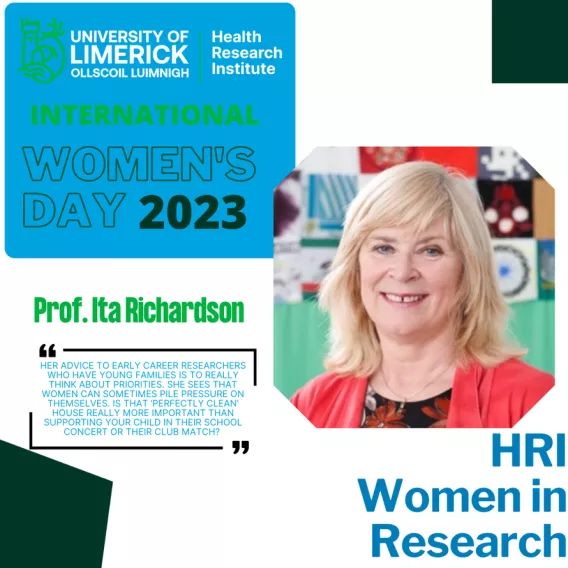
Ita Richardson, Professor of Software Quality
Twitter: @itajrd Linked-in: ita.richardson@ul.ie
Prof Ita Richardson is Professor of Software Quality in the Department of Computer Science and Information Systems at the University of Limerick, a Co-Principal Investigator in Lero – the Science Foundation Ireland Research Centre for Software, and a Principal Investigator in the Ageing Research Centre in UL. She leads projects on Connected Health, Global Software Engineering, and Gender issues in STEM. Ita has over 200 publications, has supervised 1 Habilitation student and 20 PhD students to completion and is currently supervising 3 PhD students. She has received funding for her research from a variety of agencies including Science Foundation Ireland, Irish Research Council, European Union and Enterprise Ireland. Her collaborators have included IBM, Ocuco and Johnson & Johnson, and public bodies such as University Hospital Limerick Group and the Health Service Executive. She led the University of Limerick Equality and Human Rights portfolio from 2017-2020.
Ita has undertaken research within her own team and with researchers from other disciplines, each of whom brings different knowledge to the work. Ita believes that researching with others has brought a richness to her research. Within the Health Research Institute, her research focuses on Connected Health which she defines as where patient-centred care results from following defined healthcare pathways undertaken by healthcare professionals, patients and/or carers who are supported by the use of technology (software and/or hardware), regulated when used as a Medical Device, and facilitating appropriate health data sharing (Mac Mahon & Richardson, 2022). Her recent research has designed recommendations to support those who are developing software for older adults, for persons with mild intellectual and developmental disability, and for healthcare professionals. She is also researching how remote working is changing both education and music therapy and understanding the gaps in how software systems are supporting food security.
Ita is very interested in working with healthcare professionals and academics who are interested in Connected Health research.
Tips for women researchers:
Ita has 2 grown-up children who were both infants when she started working in academia. She aimed to balance her family life with her work life. Her advice to early career researchers who have young families is to really think about priorities. She sees that women can sometimes pile pressure on themselves. Is that ‘perfectly clean’ house really more important than supporting your child in their school concert or their club match? Does everything in house and family need to be done to your ‘high’ standard – is there leeway to let some things fall by the wayside? Ita believes in networking and in making good research contacts – she travelled throughout her career, to conferences, to project meetings, to other Universities. And, although she did not prepare food nor leave out the clothes to be worn, everyone did more than survive.
When you are asked to do tasks, consider them carefully. Sometimes, you may get requests to be on programme committees, review articles, run workshops, which may not be directly related to your research, but if you enjoy doing this, then why not? In fact, Ita considers that reviewing journal and conference papers is a very effective means of keeping up-to-date with research being undertaken internationally.
She agrees that there are challenges and difficulties, but does hope that the emphasis on equality, diversity and inclusion is making life easier for the early career researchers, especially women. If you are interested in progressing your career, know the important steps at each stage. All academics are required to do some administrative work in their department – consider what you will enjoy, volunteer to do that, and do it properly. Be collegiate, your work colleagues are important. Are there particular modules that you would really like to teach – let your Head of Department know. You might not be assigned these modules immediately, but put your name into the ring. From a research perspective, build good strong relationships. There are many research groups with whom you can collaborate, Ita certainly has seen the benefits of researching within Lero and the HRI.
Ita’s hope for the future is that technology in healthcare will be implemented effectively and efficiently, taking all stakeholders into account. There is great potential to improve patient-centred care, while also ensuring that healthcare professionals are enabled to do their job well.
Role models
Ita often talks about Sr Concepta Murtagh, , in 1974, who taught her computer programming while she was at school in Loreto Convent, Mullingar, thus giving her the foundation for her career. She also appreciates the support given to her by Professor Emeritus Pat O’Connor from Faculty of Arts, Humanities and Social Science, who was ever present with career advice.
Ita’s webpage: Ita Richardson | Lero
Technical reports of interest:
Ahmad, Bilal, Sarah Beecham and Ita Richardson (2021), Towards Design Patterns for Developing Smartphone Applications for an Ageing Population – A Technical Report, 2021_TR02_Design_Patterns _ReDEAP.
Alshammari, Muneef, Owen Doody and Ita Richardson, 2023, Design Recommendations for Developing Health Information System Applications for use by Persons with Mild Intellectual and Developmental Disabilities, Lero Technical Report No. 2023_TR_02_Recommendations_MildIDD, Microsoft Word - Muneef Alshamari Technical report (lero.ie)
Some relevant publications:
-
B. Alamri, K. Crowley and I. Richardson, "Blockchain-Based Identity Management Systems in Health IoT: A Systematic Review," in IEEE Access, Volume 10, pp 59612-59629, doi: 10.1109/ACCESS.2022.3180367, 2023.
-
Motti Ader, Lilian, Bróna MacEntee, Kristina Rutkauskaite, Nutsa Chichilidze, Dylan Kearney, Sean A. Lynch, Katie Crowley and Ita Richardson, mHealth use in healthcare facilities: raising awareness in data protection, privacy and safety. In Proceedings of the 15th International Joint Conference on Biomedical Engineering Systems and Technologies – HEALTHINF 2022, ISBN 978-989-758-552-4, pages 565-572. DOI: 10.5220/0010854100003123
-
Briga Hynes, Yvonne Costin, and Ita Richardson, Educating for STEM: Developing Entrepreneurial Thinking in STEM (Entre-STEM), in Enhancing Entrepreneurial Mindsets Through STEM Education, edited by S. Kaya-Capocci and E. Peters-Burton, Chapter 8, ISBN 978-3-031-17815-3, Springer Nature Switzerland AG 2023, https://doi.org/10.1007/978-3-031-17816-0_8 6 7
-
Craig Leamy, Bilal Ahmad, Sarah Beecham, Ita Richardson, Katie Crowley, Launcher50+ : An Android Launcher for use by Older Adults, Health Informatics Conference, HealthINF, 2023.
-
Togneri MacMahon, Silvana and Ita Richardson, Regulating Connected Health: Pathways, Technology and the Patient, CPI TechREG Chronicle, Special Issue on Connected Health, September 2022. https://www.competitionpolicyinternational.com/regulating-connected-health-pathways-technology-and-the-patient/#_ftn1.
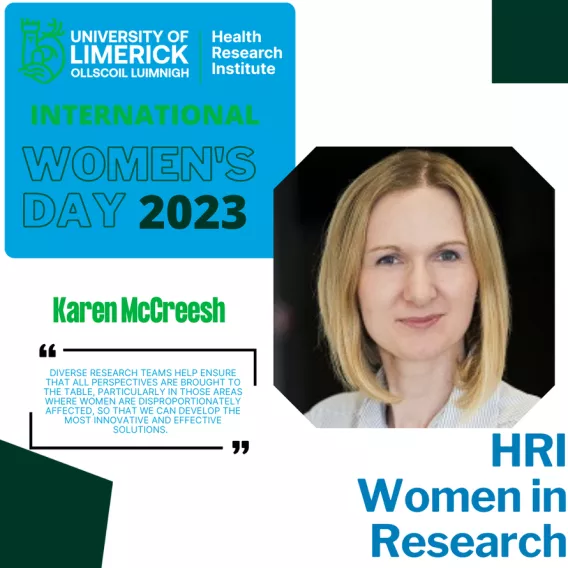
My research is about developing better care for people with painful musculoskeletal conditions. It’s important, because musculoskeletal pain is responsible for an enormous disability burden, with high economic costs for society and distressing personal consequences for those who experience it. Women are disproportionately affected by chronic pain but are more likely to have their pain experiences dismissed. I am working in partnership with Chronic Pain Ireland to develop better, more person-centred ways to support people living with pain in their own communities. I’ve been part of the Physiotherapy discipline in UL since its inception 20 years ago, and I’m very proud of the impact that our programmes have brought to physiotherapy in Ireland and the local region.
As a researcher in a female-dominated profession, female role models were very important, but so also was the support of men like my PhD supervisor Prof Jeremy Lewis, who provided mentoring and affirmation of what I was capable of. Balancing parenthood and academia is challenging and comes with compromises, but its important to keep perspective on what is important to you, and be patient … seasons shift and you will be able to focus again!
My team of postgraduates are all incredibly talented women (Dr Helen O’Leary, Kathryn Fahy, Christina Maxwell, Lorna Barry, Rachel Moore, and Niamh Brady). I do my utmost to support them balancing jobs, families and more, and breaking down the barriers to women’s advancement in research. I think the COVID pandemic was a stark reminder of how we still have a long way to go to ensure women’s perspectives are included at the highest level of research in healthcare. We must keep advocating for each other and helping those behind up the career ladder. Diverse research teams help ensure that all perspectives are brought to the table, particularly in those areas where women are disproportionately affected, so that we can develop the most innovative and effective solutions.
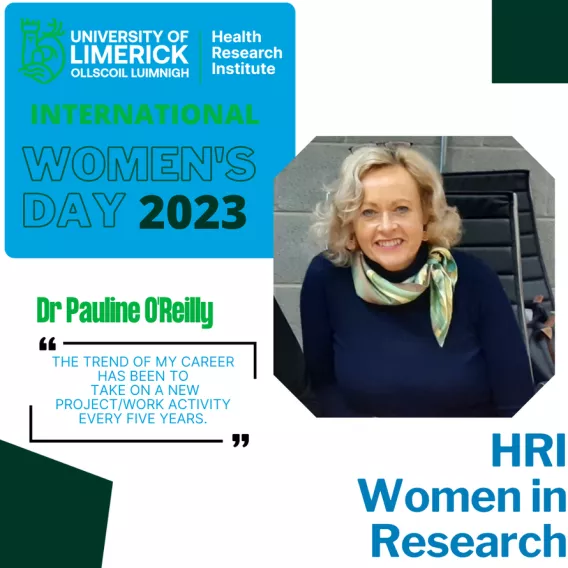
In 2000, following a number of years in nursing practice, management and nurse education, I joined the then Centre for Nursing in UL, now the Department of Nursing & Midwifery. In Ireland, nursing and midwifery education was relatively new within the university sector and the move to this sector involved an unprecedented number of changes, especially within the last 20 years. The challenge of driving and responding to this level of change was one that I embraced. Initially, there were only five of us working in the Centre. The main focus of my work was on curriculum development and preparing for the first introduction of three BSc Nursing programmes, followed shortly by the BSc Midwifery programme. The following years involved lecturing, leading as Course Director for different programmes and expanding the student base.
Concurrently to lecturing and programme development, I commenced my PhD studies in 2006. As nursing was relatively new to third level education, completing a PhD as a nurse was relatively uncommon. I undertook my PhD part-time, continuing to fill my duties as a lecturer in the Department. I graduated in 2011, and shortly after, in January 2012, I was appointed Head of the Department in Nursing and Midwifery. This was both challenging and rewarding. I quickly had to adapt to the new skill set required of the job.
In tandem with a high administrative workload, I wanted to engage and develop my own research. Consequently, I worked with colleagues in UCD, TCD and UCC on a national Nursing and Midwifery Board of Ireland (NMBI) funded project. This led to a review of the national Scope of Nursing and Midwifery Practice Framework which is used by all nurses and midwives in Ireland. In addition, we developed an analytical framework, used by the NMBI, in the development of policy related to national nursing and midwifery education and practice. I attained great experience and skills working on this project.
During my tenure as Head of Department, I also worked with Professor Anne MacFarlane, UL Medical School, on a comprehensive systematic review in the area of interdisciplinary team working within primary health care teams. Professor MacFarlane became my research mentor. She encouraged me to focus and develop my research area, of which I am most grateful. Consequently, when my time as Head of Department finished in 2017, I then adopted a more considered approach to my research. I engaged with dermatology clinicians in UHL to develop my research interest in the care of patients with Stevens Johnson syndrome/toxic epidermal necrolysis (SJS/TEN). These are devastating dermatological conditions, usually caused by an abnormal reaction to medication. Patients are catapulted into a rapid and unexpected form of acute skin failure with a significant risk to their life. My first conversation was with Ms Sheila Ryan an Advanced Nurse Practitioner (Dermatology), UHL. With Sheila’s clinical experience and my research knowledge we decided to conduct a study to evaluate the experiences and psychological impact of SJS/TEN on adults’ wellbeing. We met with Professor Bart Ramsay, Consultant Dermatologist, who was very supportive and most willing to be involved. This was the beginning of a significant study which has now developed into an international research project. Having identified a gap in the evidence, we were successful in achieving seed funding, from UL’s HRI, thereby providing the team with the basis to complete this preliminary work. We had a number of publications in the top ranked dermatology journals, and this provided us with the profile to garner support from other researchers for the next stage.
In 2021/2022, I successful led a HRB-ILP application to develop an innovative SJS/TEN quality of life (QoL) outcome measure (QoLTEN) to assess the nuanced QoL experiences of these patients. The research team, that I work with, comprises national and international clinicians and researchers. They include Ms Sheila Ryan, Professor Bart Ramsay both UHL, our own Department of Nursing and Midwifery Professors Pauline Meskell, and Alice Coffey, Dr Sarah Walsh, Kings College Hospital, London, Professor Donál Fortune, Department of Psychology, UL, Professor Saskia Ingen Housz-Oro, Henri Mondor Hospital,Paris, Professor Chris Bunker, University College Hospitals London, Prof Roni Dodiuk-Gad, Emek Medical Center, Israel, Professors Ann MacFarlane and Aelish Hannigan from the Medical School, UL and Professor Carl May, London School of Hygiene and Tropical Medicine.
The research team is both interdisciplinary and international and this should assist in raising the profile of QoLTEN, both nationally and internationally. This will also be important for the translation and sustainability of QoLTEN into policy and practice. QoLTEN should be hugely important for SJS/TEN patients and should make a notable contribution to their care.
The trend of my career has been to take on a new project/work activity every five years. I am thankful to people that have encouraged me along the way. I consider myself fortunate to have attained a lot of job satisfaction over the years and would like to thing that I will give something back. I enjoy lecturing and try to empower my students to reach their full potential, whether it is in clinical practice or research. I also enjoy mentoring others and sharing with them my experience which may be of benefit to them. Along with Professor Donál Fortune, I supervise Ms Sheila Ryan, who is now undertaking her own Professional Doctorate and notably started the QoLTEN journey with me.
Finally, I always loved working with patients in different settings and have found it a privilege. My mission is that, when we have QoLTEN developed, that it will have a positive impact on the care of patients with SJS/TEN.